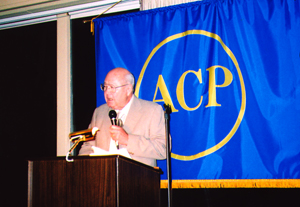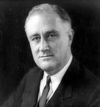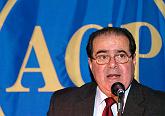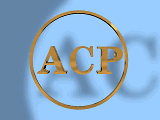Introduction of Justice Antonin Scalia
by Professor Richard Michael of Loyola University
 Justice
Robert Jackson, who sat on the United States Supreme Court in the 1940s
and early 1950s, once said, "We are not final because we are
infallible, but we are infallible because we are final." When one
reflects on this fact of finality, one realizes what an awesome power
the Supreme Court's finality constitutes. In a government that
emphasizes checks and balances, the Court is the only branch of our
government that has no external checks. No person or agency can
say that any decision of theirs is incorrect or not binding.
Justice
Robert Jackson, who sat on the United States Supreme Court in the 1940s
and early 1950s, once said, "We are not final because we are
infallible, but we are infallible because we are final." When one
reflects on this fact of finality, one realizes what an awesome power
the Supreme Court's finality constitutes. In a government that
emphasizes checks and balances, the Court is the only branch of our
government that has no external checks. No person or agency can
say that any decision of theirs is incorrect or not binding.
Accordingly, the fact of finality permits the Court to declare as law what a majority of the Court believe the Constitution and laws require or what they think those documents ought to require, and, in the name of interpreting the Constitution, adopt any laws they believe appropriate. A decision that reflects such lawmaking without authority in the text being interpreted is an unprincipled decision.
When the power of finality is exercised so as to adopt unprincipled decisions, it is anti-majoritarian (undemocratic) in that it allows an unelected branch of government to overrule the actions of the elected branches and creates a rule of men rather than that of law.
Furthermore, this danger of unprincipled decisions is no imagined danger.  Throughout our legal history many decisions of the Court have in this
manner been unprincipled. Included are the decisions of the 1930s
(now discredited) that incorporated the laissez-faire economics of
Herbert Spenser into the Due Process Clause, seriously impeding the
labor movement and the New Deal of FDR.
Throughout our legal history many decisions of the Court have in this
manner been unprincipled. Included are the decisions of the 1930s
(now discredited) that incorporated the laissez-faire economics of
Herbert Spenser into the Due Process Clause, seriously impeding the
labor movement and the New Deal of FDR.
 unprincipled decisions must come from the Court itself. The man
we are honoring today, Justice Antonin Scalia, the second senior member
of the Court, has, during his tenure on the Court, led a movement for
principled decisions. Not only has he insisted that decisions be
principled; he has also defined what he deems a principled decision to
be. Such a decision interprets, he says, the language of the text
in issue according to the words used in the document itself (not
regarding any possible intent of the draftsmen) in their context and in
accord with the meaning of these words, at the time they were enacted
into law.
unprincipled decisions must come from the Court itself. The man
we are honoring today, Justice Antonin Scalia, the second senior member
of the Court, has, during his tenure on the Court, led a movement for
principled decisions. Not only has he insisted that decisions be
principled; he has also defined what he deems a principled decision to
be. Such a decision interprets, he says, the language of the text
in issue according to the words used in the document itself (not
regarding any possible intent of the draftsmen) in their context and in
accord with the meaning of these words, at the time they were enacted
into law.
